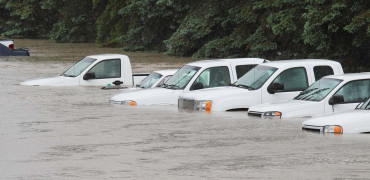While deadly fires raged through California and a freakish ‘weather bomb’ produced heavy snowfall in southern US states like Texas, the newly inaugurated President Trump chose to defy the climate scientists and global opinion as he issued an avalanche of decrees and orders.
With no sense of irony Donald Trump chose his first day in office to sign documents withdrawing the US from the Paris climate accords, while simultaneously declaring an “energy emergency”.
The President promised to greatly increase the production of oil and gas, urging the giant energy companies to “Drill, baby, drill.” Trump has also halted offshore wind power developments and targets for electric cars.
Are we pro-growth whatever the consequences, or can we achieve net zero and protect the environment?
Ignoring the rising stakes
In signing the executive order to withdraw America from the Paris agreement, Trump argued that such agreements "do not reflect our country's values or our contributions to the pursuit of economic and environmental objectives" and "unfairly burden the United States", citing rising energy costs to American taxpayers.
In doing so he ignored pleas from the leaders of low-lying countries in the Pacific and Indian oceans who fear the consequences of rising sea levels.
Under new UN rules, the US will have to wait a year until it is officially out, but by then the US will have become the only nation to have withdrawn from the Paris deal (twice) and it joins Iran, Libya and Yemen in the list of countries outside the agreement.
At the start of Trump’s second term in office the stakes for all of us are already that much higher. Afterall 2024 was the hottest year in modern times and the US is already the world's second largest annual emitter of planet-warming gases, while its total emissions since the late 19th Century are the highest of any country.
Why does 1.5C matter?
Scientists say that every 0.1C of temperature increase brings with it greater risks for the planet, such as longer heatwaves, more intense storms and wildfires.
The 1.5C target was agreed in Paris because there is very strong evidence that the impacts of global warming will become much more extreme as the world gets closer to a 2C increase. Some changes could even become irreversible, prompting some people to warn of an Armageddon type tipping point.
The science is not completely certain, but according to the UN, the consequences of a 2C global warming versus 1.5C could include the following:
- Extremely hot days would be on average 4C warmer at mid-latitudes (regions outside the poles and tropics), versus 3C at 1.5C;
- Sea-level rise would be 0.1m higher than at 1.5C, exposing up to 10 million more people to more frequent flooding;
- More than 99% of coral reefs would be lost, compared with 70-90% at 1.5C; and
- Several hundred million more people may be exposed to climate-related risks and susceptible to poverty by 2050 than at 1.5C.
Somewhat worryingly Lord Adair Turner, who is chair of the UK’s Energy Transitions Commission thinktank, says that Trump’s actions could add about 0.3C to global heating and spur other countries to dial back on their carbon-cutting efforts.
Domestic challenges
In the UK we are not shielded from these effects on our climate and weather patterns. For example we have just experienced our worst winter storms in a decade, with Storm Herminia following very quickly on the heels of Storm Éowyn. The absence of a time gap between the two storms meant the high winds and torrential rainfall had a much greater impact on communities, structures and the land across the whole of the country.
At other times this winter we are having unusually prolonged periods of dull, cloudy and windless days (rather than bright clear skies) which sees very little wind and solar power being produced, forcing us to rely on fossil fuel power stations to keep the lights on.
Climate campaigners and scientists are also becoming increasingly concerned about the Government’s growth agenda and what the Labour leadership are willing to compromise on or even sacrifice in order to achieve growth and positive news on the economy.
The Chancellor Rachel Reeves has forcefully stated her support for an expansion of Heathrow Airport, as well as a whole host of other transport infrastructure improvements, which will inevitably lead to an increase in carbon gas emissions. At the recent World Economic Forum in Davos, she said that economic growth is more important than net zero.
The Government has already said it wants to fast-track permissions for housing and commercial developments near train stations, as well as paring back on the need for environmental impact assessments. The moment of truth could arrive later in the Spring when the Government reveals how far it is willing to go in the planning and infrastructure bill designed to kickstart a building boom.
When measures in the bill to overhaul the judicial review system and strip environmental quangos of the power to delay major house-building and infrastructure developments were unveiled in January, environmentalists warned it would be “powder keg territory” if the Government dabbled with the fundamental protections around protecting the natural world.
Trump’s actions could add about 0.3C to global heating and spur others to dial back on carbon-cutting
New Bill unlikely to become law
In addition, a proposed law compelling the UK to meet new legally binding targets on climate change and protecting nature failed to clear its first hurdle in the House of Commons. The Government won a motion to end debate of the bill, meaning it will not return to the House of Commons until July and it is unlikely to become law.
The Climate and Nature Bill had been proposed by Liberal Democrat MP Roz Savage, however she said she would not push for a vote on the bill itself, having agreed to work with Government Ministers to find a way forward.
A Ministry of Housing, Communities and Local Government spokesperson said: “The planning and infrastructure bill will fast-track infrastructure delivery and home building, while enhancing our environment – delivering a win-win for nature and the economy.” Time will tell whether this can be achieved.
But before the bill is published, the Government faces another reality check as new targets will be announced later in February on cutting carbon emissions that are set to be seriously challenging. The seventh carbon budget will be set by the Climate Change Committee. The fifth and sixth carbon budgets call for a cut of 58% in emissions by 2032, and 78% by 2037, compared to 1990 levels.
On the upside UK energy industry expect more plans to emerge for converting parts of the countryside into solar farms after the Government pledged in December to triple the country’s capacity to generate solar power over the next five years. Critics say they will harm rural settings, but others say they are a necessary part of battling human-driven climate change.
Frankenstein’s monster
The UN secretary general, António Guterres was another speaker at Davos, but his message was very different to the one delivered by Rachel Reeves. He said the world’s addiction to fossil fuels is a “Frankenstein’s monster sparing nothing and no one”. “All around us, we see clear signs that the monster has become master,” Guterres said.
Guterres said: “What we are seeing today – sea-level rise, heatwaves, floods, storms, droughts and wildfires – are just a preview of the horror movie to come.” He also told the leaders of major banks, many of who pulled out of climate agreements before Trump returned to office, that they were “on the wrong side of history, the wrong side of science and the wrong side of consumers who are looking for more sustainability, not less”.
He said the same warning applied to “the fossil fuel industry and advertising, lobbying and PR companies who are aiding, abetting and greenwashing”. But he pointed to the “extraordinary economic opportunity” of renewable energy, “that will benefit people in every country and make the end of the fossil fuel age inevitable – no matter how hard vested interests try to stop it”.
Guterres highlighted the “grim irony” of analysis that showed “Thirteen of the world’s biggest ports for oil supertankers will be overwhelmed by rising sea levels. Rising seas, which are caused by rising temperatures. And rising temperatures, which are – overwhelmingly – caused by burning fossil fuels. Global heating is racing forward – we cannot afford to move backward,” he said.
The UN Secretary General urged governments to keep their Paris agreement promise to produce new national climate action plans by February, well ahead of the next major UN climate summit, Cop30 in Brazil. “We also need a surge in finance for climate action in developing countries, to adapt to global heating, slash emissions and seize the benefits of the renewables revolution.” The alternative, he said, was a “world where every economy feels the pain, of supply chains severed, of infrastructure destroyed, of higher prices and higher insurance premiums – or no insurance at all”.
All of these contrasting voices and approaches highlight the difficulty of the choices we are now being asked to make. Here in the UK we appear to be trying to ride both horses at once, or we are just guilty of deferring the tough choices we must eventually make.
Are we pro-growth whatever the consequences, or can we achieve net zero and protect the environment, while also delivering improvements in living standards? These are the issues which Ministers are grappling with right now and it’s probably not that surprising that we have not seen a totally clear policy emerge. But in the next few months clarity will have to emerge.
Patrick Mooney is news editor of Housing Management & Maintenance




